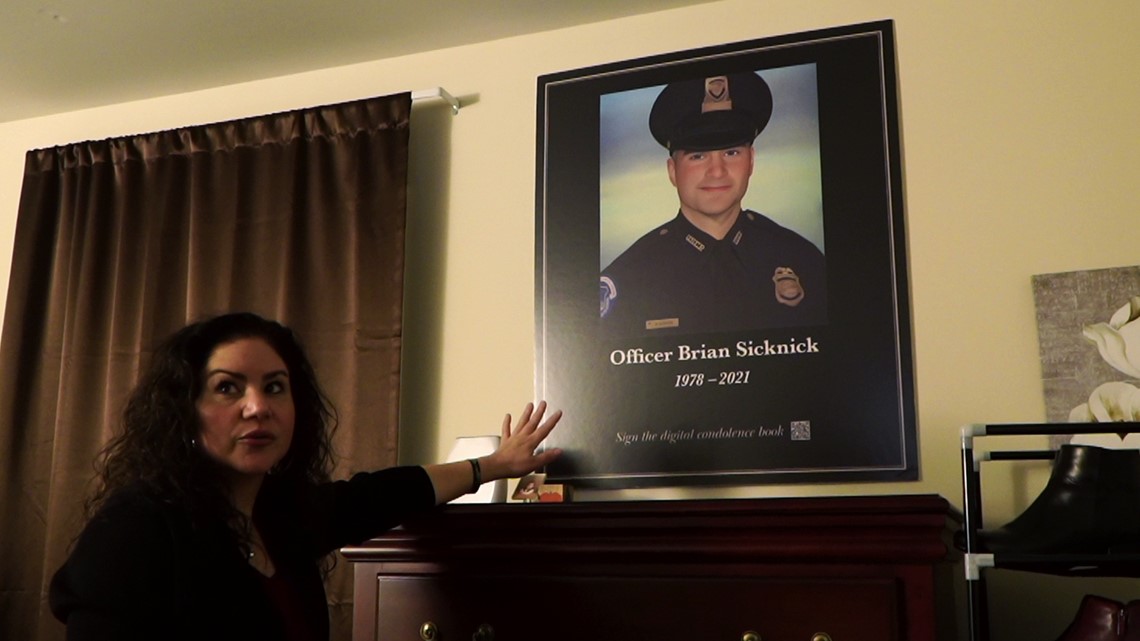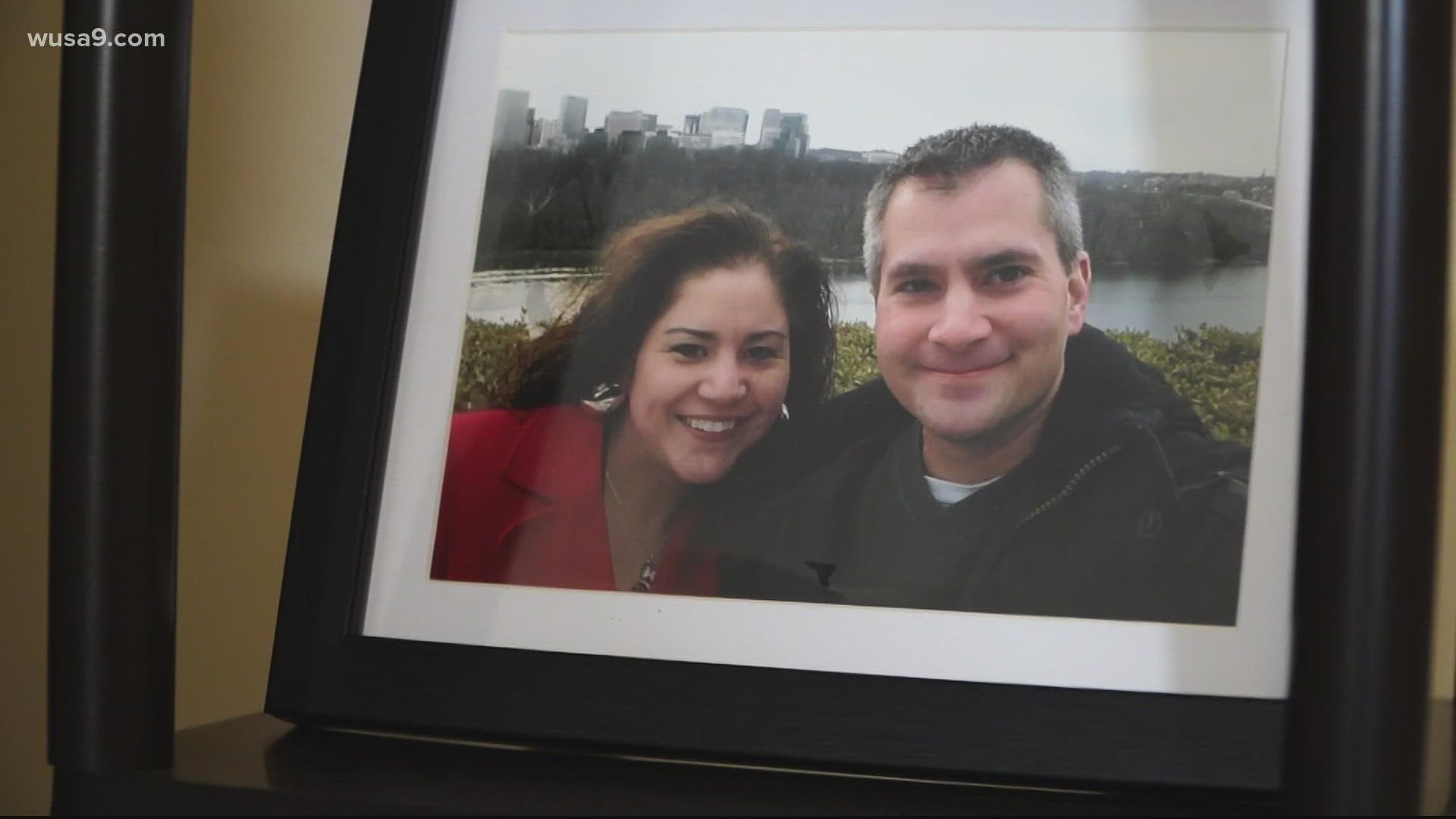WASHINGTON — Few people knew U.S. Capitol Police Officer Brian Sicknick like his partner of more than 11 years, Sandra Garza.
“Brian was like me in the sense that, you know, he was kind of a homebody,” Garza said. “We loved to go out to eat, go to the movies. The movies was a big thing for us.”
The couple shared a home in Northern Virginia and two dachshunds, Pebbles and Sparky, who were like their kids.
Garza still has a home video of Sicknick and Pebbles playing with a Donald Trump bear she thought would be a cute gift for him. After all, they were both big fans of the then-president.
“On Brian's own Twitter page, he had Donald Trump's plane as his background picture,” Garza said.
That might not fit the narrative of a police officer who ended up being attacked by a vicious, pro-Trump mob. But it is not the only part of Brian Sicknick’s life, and death, that was complicated.
Six months before his death, Garza and Sicknick separated. She wanted to get married. He did not.
However, they stayed best friends – forever linked by all that history together and Pebbles and Sparky. It was the dogs who brought Garza back to Sicknick’s home on January 6.
“He had told me that, because of the protests, that he was going to be working a lot of extra hours,” Garza said. “And he needed me to stay in the house to take care of our dachshunds. And I said, absolutely, not a problem.”
“That was the last conversation that we had.”


As the violence that day escalated, Sicknick’s mother Gladys became concerned because he wasn’t responding to her texts. So, she asked Garza to try and reach him.
This time Garza said he texted back.
“He basically just said that, you know, it was out of control, but he was fine,” Garza said. “And that, you know, he had been sprayed in the face with pepper spray, but that he was fine.”
By nightfall, the situation at the Capitol calmed and so had Sandra’s nerves about Sicknick’s safety. Until her phone rang.
A state trooper told Garza that Sicknick had collapsed and was being rushed to George Washington University Hospital. But when Sandra got to the emergency room, she says she was initially told he was fine.
“So I was kind of thinking, okay, maybe this is a mistake,” she said.
Then, Garza said, one of the doctors took her to a private area to give her more information.
“They told me that he was on a ventilator. That his heart had actually stopped,” Garza said. “He had to be resuscitated.”
Sicknick held on overnight. His mom arrived from New Jersey to be by his side. Then, at about 5 p.m. on January 7, Garza said the family got another gut punch from the doctors.
“In a nutshell, Brian was brain dead,” Garza said.


In tears and disbelief, Garza said the family made the agonizing decision to take him off life support. But before that moment came, Sicknick’s heart stopped again. After an hour of CPR, the family told the doctors to let him go.
Garza said she was one of the first allowed in the room to say goodbye.
“He was laying right there,” Garza said, motioning in front of her body as she choked back tears. “And I touched this form and his forearm was still warm. So, I kept my hand on his forearm. And I was just looking at him and I was just telling him I love him so much, and that I still couldn't believe he was gone.”
“I kissed him on his forehead, and I said, 'I will always love you forever, Brian, always.'”
On February 3, 2021, United States Capitol Police Officer Brian Sicknick was laid to rest with full honors – memorialized in the same US Capitol Rotunda he fought to protect.
His autopsy took more than three months to complete. The D.C. Chief Medical Examiner ultimately ruled Brian died of natural causes after suffering two strokes – leaving some to downplay his death, and the role the Capitol riot may have played in it.
“That’s the other part that really angers me, is that people, you know, said online or on different media outlets, well, you know, his death was natural, so we can just toss it away. He doesn't deserve all the recognition he’s getting," Garza said. "Bull***t. He does. He was out there, busting his hump, helping his colleagues and doing his best to keep those people at bay.”
At least two of the nearly 700 people now charged in the Capitol riot, Julian Khater and George Tanios, now face felony charges for assaulting Sicknick and two other Capitol Police officers with pepper spray. And while the wheels of justice turn for them, life has ground to a halt for Garza. Since Sicknick's death, she has returned to live in the home the couple shared for years.
Garza said she can still feel his spirit in the home.
“It’s comforting to me," she said.
In fact, Sicknick’s jeans still hang on the door where he left them when he went to work on January 6. Garza said she just can’t bring herself to pack them away.
“I guess that’s the best word. It feels like finality. Like he’s gone forever,” Garza said.
Garza said she’s not ready for that. Not yet.
Garza said Trump never called to offer his condolences. She hopes the congressional committee now investigating what happened at the Capitol on January 6 will determine once and for all that it was Trump who ultimately incited the riot Sicknick fought so hard to stop.
We're tracking all of the arrests, charges and investigations into the January 6 assault on the Capitol. Sign up for our Capitol Breach Newsletter here so that you never miss an update.

